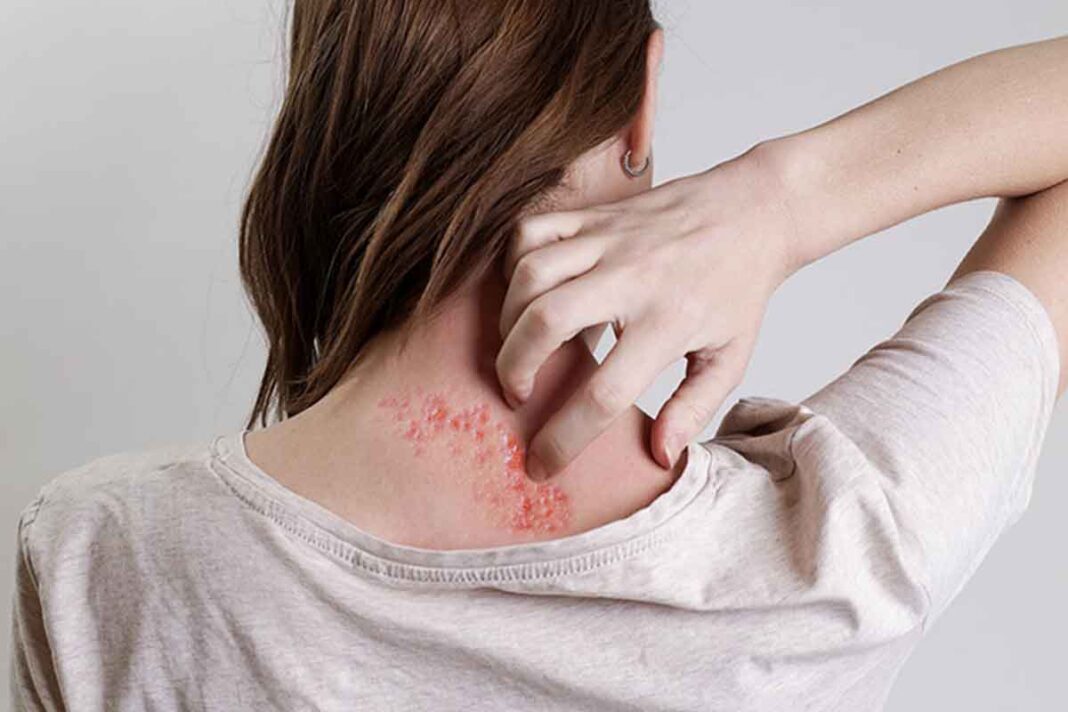Herpes zoster, also known as shingles, is a viral infection caused by the varicella-zoster virus, the same virus responsible for chickenpox. It is more common in people over 50 years old, but it also affects younger individuals.
After chickenpox, the virus remains inactive in the body, lodged in the nerve ganglia, and can be reactivated at some point in life, resulting in herpes zoster.
Reactivation of the varicella-zoster virus usually occurs when the immune system is weakened due to factors such as illness, aging or use of certain medications. Let’s talk about herpes zoster?
Difference between herpes zoster and other herpes
The main difference between herpes zoster and other types of herpes, such as herpes simplex (which includes cold sores and genital herpes), lies in the causative virus and clinical manifestations.
While herpes simplex is caused by herpes simplex viruses type 1 (HSV-1) and type 2 (HSV-2), herpes zoster it is caused by the varicella-zoster virus (VZV).
Another important difference is in the symptoms and location of the lesions. In herpes simplex, the lesions usually appear on the lips, while in herpes zoster, the rash occurs along a specific nerve.
Symptoms of herpes zoster
Symptoms of herpes zoster include:
Pain
Pain is usually the first symptom to be noticed and can be intense and persistent. It is described as a burning, tingling or stinging sensation in the affected region.
Pain may precede the appearance of injuries and may persist even after healing.
Rash
After a day or two of pain, a characteristic rash appears in the affected area.
The rash consists of small blisters grouped together on a reddish base. The blisters can rupture, forming scabs that eventually heal.
Itch
Along with the rash, it is common to experience severe itching in the affected area.
Scratching the blisters can increase the risk of secondary infection and leave scars.
General details about herpes zoster
Herpes zoster typically affects one side of the body, following the path of a specific nerve, often in areas such as the torso, face, neck, or eyes.
In some cases, the infection can affect the nerves that control muscles, leading to complications such as muscle weakness or temporary paralysis.
The diagnosis of herpes zoster is made based on characteristic symptoms and a physical examination performed by a healthcare professional. In some cases, laboratory tests may be requested to confirm the presence of the virus.
Treatment and prevention
Treatment for herpes zoster aims to alleviate symptoms, prevent complications and speed healing.
Antiviral medications may be prescribed to reduce the duration and severity of the outbreak, as well as pain relievers to ease pain. Cold compresses, soothing lotions and antihistamines can be used to relieve itching.
It is important to remember that herpes zoster is contagious to people who have never had chickenpox or who have not been vaccinated against the disease. Therefore, it is necessary to avoid direct contact with the blisters until they are completely healed.
Preventing herpes zoster can be done through vaccination. The herpes zoster vaccine is mainly recommended for people over 50 and is available in many countries.
Conclusion
Herpes zoster is a viral infection caused by the reactivation of the varicella-zoster virus, which remained inactive after chickenpox. This condition can occur at any age, but is more common in older people.
It is important to note that herpes zoster is not transmitted from person to person, except in the case of a person who has never had chickenpox or has not been vaccinated comes into direct contact with herpes zoster blisters and develops chickenpox.
Prevention of herpes zoster is possible through vaccination, especially for individuals over 50 years of age. The herpes zoster vaccine can significantly reduce the risk of developing the disease and its complications.
It is essential to seek appropriate medical attention for proper diagnosis and treatment.
Furthermore, awareness about symptoms, prevention and the importance of vaccination are essential to reduce the incidence and impacts of herpes zoster in the population.
Frequently asked and common questions on the topic
- Are herpes zoster contagious ?
Herpes zoster is not transmitted from person to person, except if a person who has never had chickenpox or has not been vaccinated comes into direct contact with herpes zoster blisters and develops chickenpox.
- What are the main symptoms of herpes zoster?
Symptoms of herpes zoster include severe pain in the affected area, a rash with blisters grouped together on a reddish base, and itching in the affected area.
- Is there a cure for herpes zoster?
There is no definitive cure for herpes zoster, but proper treatment with antiviral medications can help alleviate symptoms, speed healing, and prevent complications.
- What are the possible complications of herpes zoster?
Herpes zoster can lead to complications such as postherpetic neuralgia, which is persistent pain that can last months or even years after the lesions have healed.
Furthermore, the infection can affect the eyes, causing eye problems such as conjunctivitis, corneal inflammation and even vision impairment.
- How can I reduce my risk of developing herpes zoster?
The best way to reduce the risk of developing herpes zoster is through vaccination. The herpes zoster vaccine is mainly recommended for people over 50 and is available in many countries.
Furthermore, it is important to maintain a healthy lifestyle, with a balanced diet, regular physical exercise and stress control, to strengthen the immune system and reduce the likelihood of reactivation of the varicella-zoster virus.

